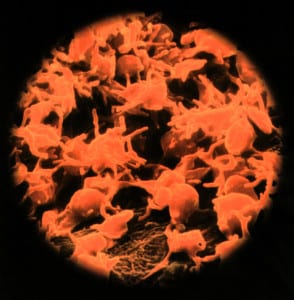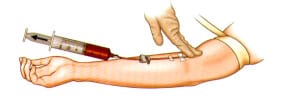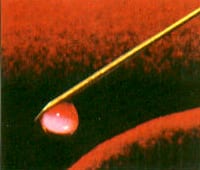Platelet Rich Plasma (PRP) Injections
PRP (platelet rich plasma) is an autologous blood therapy that stimulates your body’s natural healing process through the injection of its own growth factors into injured areas. We are pleased to offer platelet rich plasma to our Greenville, Spartanburg, and Anderson area patients.

Your body naturally recruits platelets and white blood cells from the blood to initiate a healing response. Under normal conditions, platelets store numerous growth factors which are released in response to signals from the injured tissue. Special PRP devices concentrate platelets from whole blood. When the PRP is injected into the damaged tissue growth factor release is enhanced so that natural healing is accelerated. Desired results include by enhancing the body’s natural healing capacity, and a more rapid, more efficient, more thorough restoration of tissue to a healthy state.
Typically Prolotherapy treatments are tried first. If results from traditional Prolotherapy treatments are not sufficient, however, PRP injections may be employed. Conditions treated by PRP injections include tendon and ligament injuries, acute and chronic muscle strain, joint pain such as arthritis and knee meniscus damage and back or neck pain.

The process involves drawing blood, spinning it down to separate out growth factor rich platelets, then injecting the platelet rich plasma into the injured area. To make the injection more comfortable, local anesthetic (numbing medicine) or nerve blocks are performed first. To help ensure accuracy of placement, Ultrasound guidance is employed.

Most patients don’t require anything more than acetaminophen for pain from the procedure. Often, following a PRP injection, an “achy” soreness is felt. This “soreness” is a positive sign that healing has been set in motion. The soreness can last for several days but gradually decreases as healing and tissue repair occurs. It is important that anti-inflammatory medications such as Ibuprofen, Aleve and Aspirin be avoided following PRP treatments.
These medicines may block the effects of the PRP injection. While many patients find it best to rest the area for several days after PRP, as long as you are responsible you can resume normal activities following I treatment. You should avoid anything other than light activity however for at least several days after injection.

Depending on your response to treatment, one to three PRP injections may be required. Following the initial treatment a follow up visit will usually be scheduled within 2-3 weeks. At that time a decision may be made regarding the need for additional treatment. In general, chronic or severe injuries require more treatment then mild injuries. Restorative therapy including exercise or physical therapy may be prescribed as well.
PRP has been used since the 1980’s in surgical and dental procedures and since the 1990’s in musculoskeletal medicine. Research and clinical data show that PRP injections are extremely safe, with minimal risk for any adverse reaction or complication. Because PRP is produced from your own blood, there is no concern for rejection or disease transmission. There is a small risk of infection from any injection into the body, but this is rare. Some research suggests that PRP may have an anti-bacterial property which protects against possible infection.
PRP offers a new and exciting treatment option for people with a wide range or musculoskeletal problems that previously did not exist. Outcomes have been quite favorable. As medicine evolves it is likely that more uses of the body’s natural wound healing cascade to accelerate healing will be employed.





